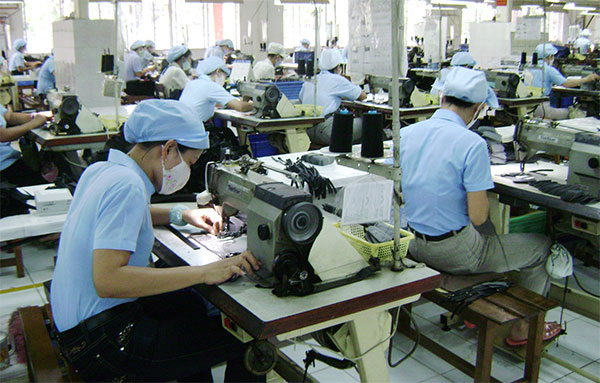Vietnam spins yarn on TPP roadmap delay

Minister of Planning and Investment (MPI) Bui Quang Vinh said the United States and other countries involved in the negotiation of this agreement (TPP) needed to accept a roadmap for Vietnam to fully meet the strict requirements included in the TPP which is expected to be inked next year.
“There are many obstacles that face even developed countries like the US, Japan and Australia. However, there is no way that Vietnam can meet certain criteria at the moment due to the country’s lower development level,” he said.
For example, Vietnam is currently negotiating the ‘yarn forward’ rule of origin under the TPP. Under this rule, in order to enjoy a 0 per cent import tax rate - instead of the existing 17-20 per cent charge from the US which imports 55 per cent of Vietnam’s garment and textile products, all manufacturing processes including yarn spinning, knitting and dyeing must be carried out in a TPP member country.
“In order to meet this rule, Vietnam will need time to attract more investors into making garments and textile materials. At present, the majority of the country’s input materials are imported from non-TPP countries,” Vinh said.
Only a handful of Vietnamese-invested firms such as the Thanh Cong Textile Garment Investment Trading Joint Stock Company (TCM) could benefit from the 0 per cent tax rate in the US after the TPP is clinched.
TCM has a closed production chain from fibre processing to making finished products. Notably, it imports 55 per cent of cotton from the US, and exports 40 and 20 per cent of its apparel products to the US and Japan, respectively, which are TPP members.
According to Viet Capital Securities Company, this ‘yarn forward’ rule will help Vietnam attract more foreign makers in fibre, cloth and apparel to build factories to provide materials for Vietnam-based garment and textile firms which currently having to import 80 per cent of input materials from non-TPP members such as China, Taiwan and South Korea. However, Vietnam will need to provide incentives to turn this into a reality.
During her working visit to Hanoi last week, Caroline Atkinson, US deputy assistant to the president and deputy national security advisor for international economics, said that under the TPP, Vietnam needed to open up services, finance and public procurement. The country also needed to make a stronger commitment on protecting intellectual property rights (IPR), and loosen limits on opening branches of foreign insurance firms and banks.
“We have worked with some investors and enterprises on their wish to invest in Vietnam. They wonder how long it will take to establish enterprises in Vietnam in these sectors, and how their technology can be protected in Vietnam,” she said.
According to the MPI, Vietnam will further improve the online customs, IPR and services, and create a larger space for foreign insurance firms and foreign banks.
“We are actively negotiating the TPP to reach common agreement,” Vinh said.
A four-day ministerial meeting on TPP negotiations was completed last week in Singapore where the 12 negotiating countries’ ministers claimed they had made “substantial progress” toward completing the TPP. However there was little sign of agreement on thorny issues such as intellectual property, IPR, public procurement, agricultural tariffs and state-owned enterprises.
TPP is a multilateral free trade pact in the Pacific region, gathering 12 countries, namely Australia, Brunei, Canada, Chile, Japan, Malaysia, Mexico, New Zealand, Peru, Singapore, the United States, and Vietnam. If signed, the pact will cover almost 40 per cent of global gross domestic product.
What the stars mean:
★ Poor ★ ★ Promising ★★★ Good ★★★★ Very good ★★★★★ Exceptional
Latest News
More News
- NAB Innovation Centre underscores Vietnam’s appeal for tech investment (January 30, 2026 | 11:16)
- Vietnam moves towards market-based fuel management with E10 rollout (January 30, 2026 | 11:10)
- Vietnam startup funding enters a period of capital reset (January 30, 2026 | 11:06)
- Vietnam strengthens public debt management with World Bank and IMF (January 30, 2026 | 11:00)
- PM inspects APEC 2027 project progress in An Giang province (January 29, 2026 | 09:00)
- Vietnam among the world’s top 15 trading nations (January 28, 2026 | 17:12)
- Vietnam accelerates preparations for arbitration centre linked to new financial hub (January 28, 2026 | 17:09)
- Vietnam's IPO market on recovery trajectory (January 28, 2026 | 17:04)
- Digital economy takes centre stage in Vietnam’s new growth model (January 28, 2026 | 11:43)
- EU Council president to visit Vietnam amid partnership upgrade (January 28, 2026 | 11:00)
















 Mobile Version
Mobile Version